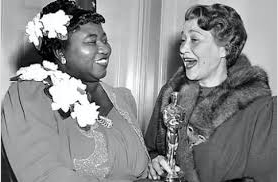A Civilization Gone with the Wind
A 1940 photograph captured a pivotal Oscar moment between actresses Fay Bainter and Hattie McDaniel. Today, the black and white image is considered politically incorrect as Fay’s jacket held a fox fur collar, the eyes of the animal reflecting its final agonized moment. However, at the time what was politically incorrect was the Academy of Motion Pictures Arts and Sciences had broken the color barrier by making Hattie McDaniel the first African American to receive an Academy Award for her role as Mammy in Gone with the Wind. Adorned with white magnolias on her hair and dress, Hattie’s sixty-seven second emotional acceptance speech stated she “hoped to be a credit to her race.” 
While many whites were irate that a black woman had usurped the Best-Supporting Actress Oscar, the black community likewise made her the target of poisoned darts. Walter White, head of the National Association for the Advancement of Colored People, labelled her an Aunt Tom; he argued that playing a 300 pound domestic promoted a shameful stereotype. Her rebuttal to the white and black criticism, “I’d rather play a maid and make $700 a week than be a maid and make $7.00.”
Fast forward eighty years and Gone with the Wind, the most commercially successful film in history, is still proving divisive. HBO Max, following the lead of the current zeitgeist that anything imbued with a racist tint should go the way of toppled Confederate statues, temporarily excommunicated it from their catalog. Censoring the film is to downplay the fact that it brought Hattie McDaniel, the daughter of slaves, the ultimate cinematic accolade. The removal paves the way for the mindset that art exists solely as a tool for upholding morality rather than for entertainment and enlightenment into the human condition.
Moreover, banning of books, paintings, and plays ushers in a slippery slope. The Nazi Minister of Propaganda, Joseph Goebbels, orchestrated a bibliocaust where he consigned to the flames the words of what he considered degenerate authors, those whose ideas did not mesh with the ideology of Third Reich. Among scores of others, the literary bonfire consumed the works of Sigmund Freud, Ernest Hemingway, Franz Kafka. Another name on the spine of the doomed volumes was the 19th-century German poet Heinrich Heine who proved chillingly prophetic, “Where they burn books, they will, in the end, also burn people.”
The cost of the collateral damage of banning the printed word is incalculable. In the past few years, school districts have removed To Kill a Mockingbird and Huckleberry Finn from the curriculum due to racial insensitivity. As a high school English teacher, I was aghast. My classroom is a forum where my students debate both sides of an issue, understanding dual perspectives make them not only better readers, it also makes them better people. Hiding the injustices of history does not make the evil go away. Rather, by exposing them to past injustices makes them more attune to present wrongs. We cannot be like the three proverbial monkeys: hearing, seeing, and speaking no evil does not make the evil go away. Dust under the rug, although unseen, is nevertheless yet present.
The current situation with HBO Max makes one wonder how far the morality arbitrators will go. By the current thermometer, Shakespeare’s The Merchant of Venice should go the way of the dodo as Shylock is the archetypal penny-pinching Jew. Lolita should be exiled to Siberia for its protagonist’s relentless lusting after a 12-year-old girl. The four fab femmes from Sex in the City should be dismissed for their anti-feminist pursuit of men, money, and Manolos.
One of the ongoing historical debates concerns Auschwitz. One school of thought is the former concentration camp should be razed as it is a monument to a time when mankind buried its humanity. However, all the camps must remain-as a dire warning to where unfettered hatred can lead. As George Santayana wrote, “Those who do not remember the past are condemned to relive it.” Works of art should never be hidden from public view as they are mirrors of their eras, and therefore should not be scrutinized under the modern lens of racism, sexism, anti-Semitism. By scrutinizing yesterday’s classics with contemporary eyes, brrrrrrr….baby, it will be cold in here.
Examining yesterday through today’s lens is analogous to dressing Scarlett in Daisy Dukes; the result would be jarring. We must be wary of superimposing one era over another. Fay Bainter, by stepping out in her fox-fur collar in our contemporary milieu, would become a candidate for a PETA flour-bombing, although at the time her outfit was the height of fashion. If Ray Bradbury’s Fahrenheit 451 becomes the new norm, artistic creativity, like the Old South, will be a civilization gone with the wind.

